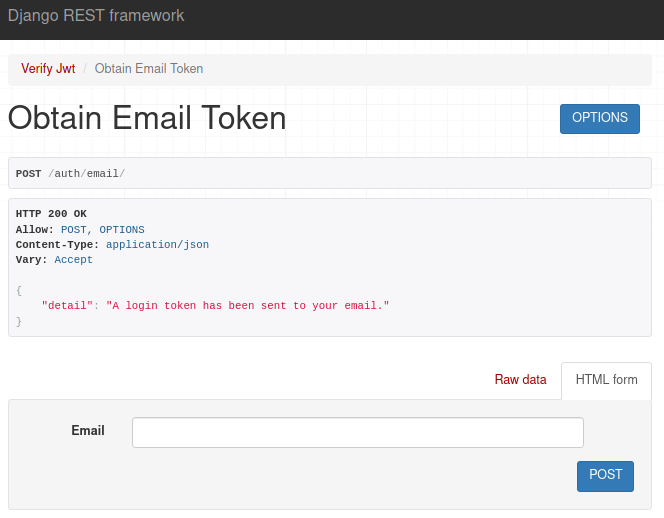drf-passwordless-jwt is a JWT passwordless authentication service
for the Django REST framework.
$ curl -X POST -d "[email protected]" localhost:8000/auth/email/
{"detail":"A login token has been sent to your email."}
Enter this token to sign in: 527389
$ curl -X POST -d "[email protected]&token=527389" localhost:8000/auth/jwt/
{"token":"eyJhbGciOiJIUzI1NiIsInR5cCI6IkpXVCJ9.eyJlbWFpbCI6Inh5YkB0ZXN0LmNvbSIsImV4cCI6MTY3NTI2Njg0NH0.a7RgJLEbeFSQeFZ93qjC2iHo_wabglwzBZ9fe9D-rfw","email":"[email protected]"}
$ curl -X POST -d "token=eyJhbGciOiJIUzI1NiIsInR5cCI6IkpXVCJ9.eyJlbWFpbCI6Inh5YkB0ZXN0LmNvbSIsImV4cCI6MTY3NTI2Njg0NH0.a7RgJLEbeFSQeFZ93qjC2iHo_wabglwzBZ9fe9D-rfw" \
localhost:8000/auth/
{"email":"[email protected]","exp":"2023-02-01T15:54:04Z"}It uses Django REST framework, so you can also access this interface through your browser.
You should customize your configuration to suit your requirements. All configurations can be set via environment variables. The following are the configured default values:
# 0: production, 1: devlopment
DJANGO_DEBUG = 1
# specify hosts seperated by commas
DJANGO_ALLOWED_HOSTS = '*'
# 1: print email to screen, not sending
EMAIL_BACKEND_TEST = 0
# email from
OTP_EMAIL_ADDRESS = '[email protected]'
# token expire time, default 5 minutes
OTP_TOKEN_EXPIRE_SECONDS = 300
# email subject
OTP_EMAIL_SUBJECT = 'Your Login Token'
# email text message
OTP_EMAIL_PLAINTEXT = 'Enter this code to sign in: %s'
# email html message template file
# set it to 'passwordless_zh_token_email.html' to use the built-in Chinese template.
OTP_EMAIL_HTML = 'passwordless_token_email.html'
# 1: ssl smtp
EMAIL_USE_SSL = 0
# 1: tls smtp
EMAIL_USE_TLS = 0
EMAIL_HOST = 'smtp.mydomain.com'
EMAIL_HOST_USER = '[email protected]'
EMAIL_HOST_PASSWORD = 'password'
EMAIL_PORT = 465
EMAIL_FROM = '[email protected]'
# fail if smtp server response too slow
EMAIL_TIMEOUT = 3
# regex, for example: '.*@mail1.com$|.*@mail2.com'
EMAIL_WHITE_LIST = r'.*'
# message on rejection
EMAIL_WHITE_LIST_MESSAGE = 'unacceptable email address'
# specify hosts separeated by commas
CORS_ALLOWED_ORIGINS = ''
# 1: accept any remote host
CORS_ALLOW_ALL_ORIGINS = 0
DB_ENGINE = 'django.db.backends.sqlite3'
DB_NAME = BASE_DIR / 'db.sqlite3'
DB_USER = 'postgres'
DB_PASSWORD = ''
DB_HOST = ''
DB_PORT = ''
# JWT secret string
JWT_SECRET = 'secret-for-jwt'
# JWT expire time, default 30 days
JWT_EXPIRE_SECONDS = 2592000During development, you can build and run it on your local host:
$ docker build -t auth .
$ docker run --rm -p 8000:8000 -e EMAIL_BACKEND_TEST=1 authThere are pre-built docker images.
You can use docker-compose for deployment.
This is a template of docker-compose.yml:
version: "3"
services:
auth:
image: xieyanbo/drf-passwordless-jwt:latest
container_name: auth
environment:
- TZ=Asia/Hong_Kong
- DJANGO_SECRET_KEY=secret-string
- DJANGO_DEBUG=0
- [email protected]
- OTP_TOKEN_EXPIRE_SECONDS=300
- OTP_EMAIL_SUBJECT=Your Login Token
- OTP_EMAIL_PLAINTEXT=Enter this code to sign in: %s
- OTP_EMAIL_HTML=passwordless_token_email.html
- EMAIL_BACKEND_TEST=0
- EMAIL_USE_SSL=0
- EMAIL_USE_TLS=1
- EMAIL_HOST=smtp.mydomain.com
- EMAIL_PORT=465
- [email protected]
- EMAIL_HOST_PASSWORD=password
- EMAIL_FROM=xyb@mydomain
- EMAIL_WHITE_LIST=.*@mydomain.com$$|.*@mydomain2.com$$
- EMAIL_WHITE_LIST_MESSAGE=for mydomain.com and mydomain2.com only
- JWT_SECRET=secret-for-jwt
- JWT_EXPIRE_SECONDS=2592000
ports:
- 8000:8000
restart: always